An infographic of the racial wealth gap in the U.S.
Economic Justice
The effects of the federal funding sequester are beginning to hit, and it’s not a pretty picture. Amanda Terkel and Sam Stein at Huffington Post write that while the damage is being downplayed, it is very real and painful.
“Organizations and companies have begun laying off workers, while many more have decided not to staff vacant positions. Schools on military bases are contemplating four-day weekly schedules. Food pantries have closed, as have centers that provide health services. Farmers have been forced to go without milk production information, causing alarm in the dairy industry and the potential of higher milk prices. Workers at missile-testing fields are facing job losses. Federal courts have closed on Fridays. Public Broadcasting transmitters have been shut down.”
They go on to list 100 specific stories from the past week of cuts that are taking place across the country. It’s a broad swath effecting many thousands of people. And the longer it goes on, the worse it will become.
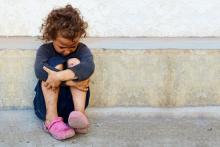
IN AMERICA, WE honor the ideal of equality and the myth of equal opportunity—but the secret we refuse to acknowledge is the debilitating, dehumanizing effects of poverty. As a pastor serving the South Side of Chicago, I witness firsthand the pain that poverty inflicts upon our congregation and the scars it leaves on the most vulnerable: children. Faith in Christ should mean a commitment to the poor.
There is a growing wealth gap between African-American households and white households. A Pew research study, for example, shows the dramatic change between 2005 and 2009. In 2005, the typical white household had a net worth of $134,992 (in 2009 dollars), while the typical black household had a net worth of $12,124—9 cents for each dollar the white household owned. By 2009, that fell to 5 cents, as the typical black household saw its net worth drop more than 53 percent, as compared to a drop of 16 percent for the average white household. And, alarmingly, 35 percent of black households in 2009 had a zero or negative net worth.
A few seek to blame this damaging downward trend on the current administration's policies. This is unfair and incorrect. Black families have traditionally built wealth through homeownership, but since the mid-1990s we have witnessed a dramatic increase in bank mergers—and predatory lending. Local banks, now owned by large corporate institutions with little interest in community investment, increasingly close branches in poor communities, then check-cashing establishments fill the void in financial services. At the same time, our nation faces the loss of manufacturing and the dismantling of organized labor. The triple threat of regressive economic policy, unchecked expansion of large, unaccountable financial institutions, and the economic crisis of 2008 devastated parts of cities across the nation: Chicago, Cleveland, Detroit, Atlanta, New York, Buffalo, Flint, and many others.
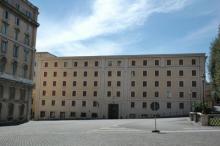
VATICAN CITY — Shunning the spacious papal apartment used by his predecessors, Pope Francis has chosen to continue living in the Vatican guesthouse where he has been staying since the beginning of the conclave.
The Vatican’s chief spokesman, the Rev. Federico Lombardi, explained on Tuesday that Francis will live “until further notice” in a suite in the Santa Martha Residence, a modern Vatican guesthouse for priests and bishops who work in the Roman Curia or who are visiting the Vatican for meetings and conferences.
Francis made his intentions clear on Tuesday morning, while celebrating Mass in the residence’s chapel for its permanent guests, who occupy about half of the residence’s 130 or so rooms.
The pontiff’s choice is a consequence of his desire to adopt a “simple” living arrangement that allows him “to live in community” with other priests and bishops, Lombardi explained.

During this Holy Week, Christians around the world turn inward to reflect on the mystery and miracle of the death and resurrection of our Lord, Jesus Christ. Those two surpassing events are more than good enough to occupy the mind and heart of every believer.
But they are not all that Jesus did in these eventful days. As any student of the scriptures will know, Jesus did not go quietly to the cross. Three days before his execution, he stormed the temple and challenged the seat of theocratic power in Jerusalem, condemning the pharisaic elite who "preach, but do not practice" and "tie up heavy burdens, hard to bear, and lay them on the people's shoulders." (Matt. 23:3-4) He accused as hypocrites leaders who make token offerings yet "have neglected the weightier matters of the law: justice and mercy and faithfulness … Inside they are full of greed and self-indulgence." (Matt. 23:23,25)
In his final teaching before the events of Maundy Thursday and Good Friday began, Jesus embraced those who are oppressed and cautioned his disciples that acts of love and mercy are the measure of a heart touched by grace. "For I was hungry and you gave me food, I was thirsty and you gave me drink, I was a stranger and you welcomed me, I was naked and you clothed me, I was sick and you visited me, I was in prison and you came to me … Truly, I say to you, as you did it to one of the least of these my brothers, you did it to me." (Matt. 25:35-40)
In honor of the occasion, Congress will close its doors and lawmakers will head home to be with their constituents for the Easter recess. If inside reports are to be trusted, they will leave Washington "armed with excuses" that explain away the latest fiscal fiasco, and the people will have little to say in reply. I pray it isn't so.
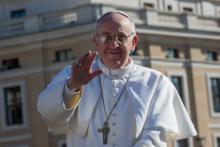
Since the moment of his election on March 13, Pope Francis has been warmly embraced by his own flock and even the media and the wider public in a way his bookish predecessor, Benedict XVI, was not.
Such an effusive welcome is especially good news for Catholic leaders who spent years fending off criticism of Vatican dysfunction under Benedict and a cloud of scandal and crisis at home. And the hot start for Francis is also crucial in building up a reservoir of good will that will be needed when the new pope refuses to bend on unpopular teachings or commits a gaffe of his own. Polls show that anywhere from 73 percent to 88 percent of American Catholics say they are happy with the selection of Francis, as opposed to about 60 percent who were happy with the choice of Benedict — and many of those are extremely pleased with the new pope.
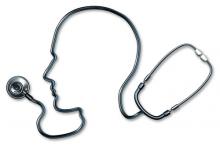
As a seminary graduate and a Masters of Social Work student, I have a passion for social justice and working to improve the wellbeing and health of vulnerable populations. After seminary, during my time as a youth leader, we often turned to Matthew 25:31-46, the familiar passage about “the least of these,” and discussed God’s emphasis on justice and serving the marginalized in our societies.
My time as a social work student, particularly through my current class on international social work, has expanded my concept of the “least of these.” We have learned about some of the most vulnerable populations around the world – child soldiers in Uganda and Colombia, young girls trafficked into the sex trade in Cambodia, HIV/AIDS patients from Haiti, migrants left to die in the desert while trying to cross the Mexican-U.S. border, and the list continues. These concepts were not completely unknown to me and would likely not be new to you either. This past week, however, we studied a different topic, one that has not drawn as much media attention – global mental health.

While having lunch recently with Harvard Professor Robert D. Putnam, I was asked an interesting question.
Putnam is appalled at the radical lack of equality of opportunity in the U.S. today, and he wanted to know if evangelical preachers would dare to say what his pastor said when he was a teenager. Putnam told me that back then, in the midst of Martin Luther King’s great campaign against segregation, his devout Methodist pastor dared to preach that “racism is a sin.”
Professor Putnam asked me, as an evangelical, whether evangelical pastors today would be ready to declare today’s great economic inequality of opportunity a sin. That’s a great question.

Louisiana faith leaders hand-delivered a letter to Gov. Bobby Jindal this morning, denouncing his proposal to increase sales tax by 47 percent as “unjust” and “regressive.”
The state already has one of the most disproportionate tax systems in the country, with low- and middle-income families paying more than twice the rate in taxes as families whose income totals more than $1 million per year. To raise the sales tax even higher, say leaders, would deal a crushing blow to the poor.
“[W]e are concerned that your plan proposes to use the increased revenue generated by a heavier burden on poor and moderate income families,” the letter reads, “not to fund any of the important needs and services our State faces, but to decrease the tax burden for those members of our community who are most blessed with wealth and resources. That … is unacceptable.”
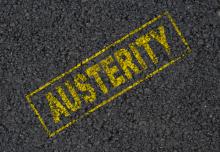
AS THE U.S. Congress and the president repeatedly battle over the debt ceiling and contemplate cuts to Social Security and Medicare, austerity has begun to sound like common sense: "Families tighten their belts during hard times, and so must government."
However, "common sense" in our media age is carefully manufactured, and its underlying analogy doesn't always hold up to scrutiny. "Living within our means," for most families, includes debt financing for housing, cars, and college. Families having a hard time paying their bills may indeed tighten their belts—but they seek more income first, and cut care for children and the sick last. In contrast, federal budget austerity arguments always focus on spending, ignoring the revenue crisis born of decades of tax cuts.
Christians have a more profound reason to question "austerity measures": They conflict with our faith in God's abundance. In parable after parable—the prodigal son, the unforgiving debtor, Lazarus and the rich man—Jesus challenges us to emulate God's generosity. It is the theme of that most eucharistic miracle, the loaves and fishes. How to live in the light of God's abundance is never an easy question, but we must be open to its logic in every area of human existence, including our personal lives, our economy, and our government.
There is, needless to say, a deep contrast between Christian notions of abundance, rooted in God's boundless creative gift, and the modern field of economics, which bases itself on the principle that commodities are scarce. Yet there are also resonances between abundance and modern macroeconomics (the study of whole economies) as it developed in the New Deal period and the first three decades after World War II—especially in the great postwar era of shared prosperity, which saw an explosive expansion of the middle class.
During that period, everyone gave to the national common good, and everyone received—not just through strongly redistributive taxation, but through shared, unprecedented economic growth. And it wasn't simply the "invisible hand" of the marketplace that guided growth: The market was fostered by government's investment in infrastructure and education.
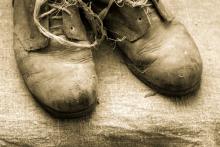
I believe that most people are good, decent folks who want to see their community thrive and be healthy. The can of worms with the globalized economic system we live with, however, is twofold. Firstly, it is pathologically designed to function towards injustice, and injustice implicates the exploitation, destitution, and ultimate collapse of local communities around the world, especially in the poorer countries. Secondly, this global economic system does all that it can to make “community” invisible. The vast majority of those coffee drinkers who stop by the local supermarket or coffee shop to buy a pound of coffee have no idea where there coffee came from, who picked it and under what consequences.
Thus, when one is confronted with the inevitability of making a “global” economic choice, my advice would be to take the time to think about what one would want for his or her own community, and then to question how that far-off, distant community across the world where this or that product is being produced is going to be affected. This is not going to be easy for it requires the determination to discover what is purposely being hidden by the designs of the global economic system. But that is perhaps the price we should be paying to be able to enjoy a hot cup of coffee grown thousands of miles away.

The announcement was broadcast at the end of the day over the school’s public address system.
"Our Teacher of the Year for 2013-2014 is ... Mr. Barton. Congratulations!"
I walked out into the third-grade hallway where students were lined up for dismissal. Little hands reached up and patted me on the shoulder. Small voices joined together and called out, "We're proud of you, Mr. Barton!" Alondra, a quiet student, pulled me close and said, "Thank you for being my reading teacher." I was honored and humbled.
As I walked back into my classroom, I reflected over my five years teaching at this Title I elementary school. "Who am I, what have I done, to become Teacher of the Year?" I asked myself.
This week's viral video is a must-see. The six-minute "Wealth Inequality in America," released Friday, presents the shocking, true size of the wealth gap in the country.
In a series of animated infographics, the video lends a visual punch to numbers that are hard to wrap one’s head around. The top 1 percent of Americans hold 50 percent of all investments in stocks and bonds, for example – while 80 percent of Americans share a paltry 7 percent of the nation’s wealth.

Our distaste for people who cut in line remains unchanged as we grow up. Whether someone gets to the front of the lunch line or the airport security check before us in an unfair way, our annoyance is raised. People who steal our parking spots during the Christmas season are the recipients of our worst thoughts. We might — just might — yell a string of expletives and death threats at anyone who has wronged us on the road or in a parking lot.
It’s not just about being orderly and following the rules. Instead, we rue the flouting of justice and fairness. I have been waiting patiently in line; what gives you the right to deem yourself better than me?
Yet if we’re honest, we will quickly realize that such outrageous reactions to outrageous behavior are no better than the line cutter or parking space thief. Moreover, our sense of injustice is quite attuned to moments of personal grievance even as we neglect how our actions may harm others. If anything, these moments of rage reveal much more about us than those we think have aggrieved us.
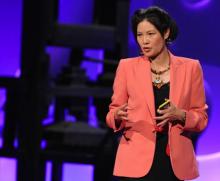
“They took the door off so the hyenas would get her.”
Sitting in the darkened room with thousands of others, I listened intently as the woman on stage continued. The speaker was no other than Sheryl WuDunn, the Pulitzer Prize-winning co-author of Half the Sky, and the setting was this year’s Justice Conference.
Having previously read Half the Sky, I was reminded again of the countless numbers of women who looked beyond their circumstances to overcome challenges, and change their families and communities for the better. I remembered the underlying causes of global gender inequality, and WuDunn’s urgent call in her book to empower girls and women. The solution to ending poverty lies in educating females and bringing them into the formal workforce. In that, women’s empowerment isn’t simply a good issue to promote, but part of creating a just world.

At the Justice Conference last weekend I had the opportunity to sit down with Nathan George, founder of Trade As One, and ask him about buying fair trade and his company's awesome — and newly launched — fair trade subscription service. Here is the fruit of that conversation.
The interview was edited for length and content.
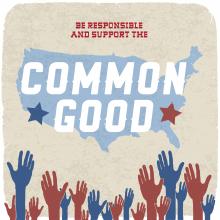
Politics at its best serves the common good — far above any one interest or political party. And right now in Washington, we see that playing out as we continue to reach accord on immigration reform. But when it comes to our budget debate, partisan ideology and special interests are winning out over the common good.
The ever-looming “sequester” that was never supposed to happen goes into effect tomorrow. Billions of dollars will be cut from domestic and military spending without any plan or strategy; jobs will be lost and people will suffer. Public frustration is growing with our elected officials, while they continue to argue over the role of government instead of governing responsibly. The press discusses who wins and loses in the polls, but it is clear that it is the common good that is losing.
On the other hand, immigration reform is being discussed, at the same time with the same political players, in a very reasonable and hopeful way. On that important policy change, bipartisan work is going forward to shape legislation that could pass both houses of Congress.
If you haven’t been paying close attention, or are still confused by the “sequester” heading for us like a runway train, veteran Capitol Hill reporter Steven T. Dennis offers “15 Things You Need to Know About the Sequester.” He calls it “things you need to know about how the sequester came to be, how it will be implemented, and the choices lawmakers face as they seek to avert it.” It’s a helpful guide thrugh the maze.
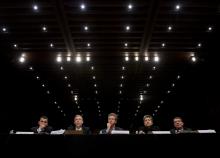
The sequester battle is a good but tragic example of how the idea of the common good is failing in American politics. By contrast, the growing bipartisan support for comprehensive immigration reform is an alternative example of how a moral issue can rise about our ideologically driven politics.
The faith community has stepped into both issues with a call for political leaders to serve the common good. On immigration, political leaders are listening to the faith leaders; on the debates about our nation’s fiscal soul, political leaders need to listen better.